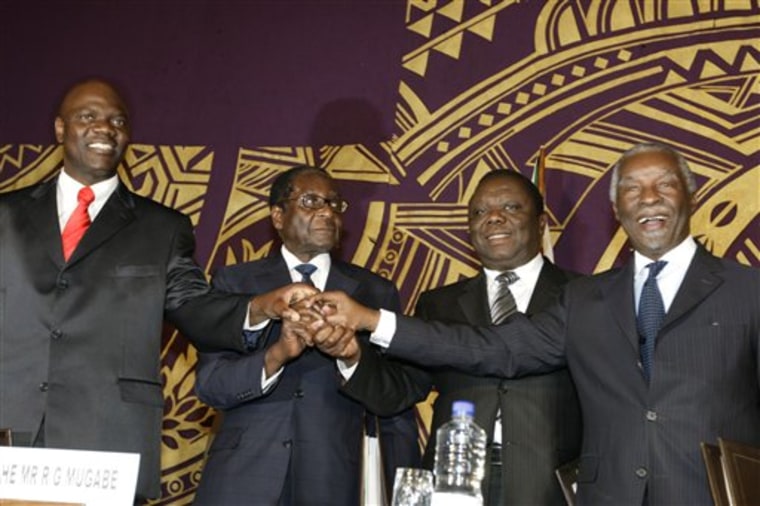Zimbabwe President Robert Mugabe, locked in a standoff with the opposition in power-sharing talks, went ahead Saturday and laid claim to all key ministries as he tries to retain his iron grip on the struggling southern African nation.
Opposition leaders denounced the move, saying it jeopardized a September power-sharing deal that had deadlocked over Cabinet posts.
Aid agencies have raised concerns that delays in forming a unity government are exacerbating the country's humanitarian crisis. Inflation is now at 231 million percent and the country will have to rely on food aid to feed nearly half its population.
Mugabe's move was revealed Saturday by the state-run Herald newspaper, which published a list from the official government gazette giving the ruling ZANU-PF party 14 ministries, including defense, home and foreign affairs, justice, media, mines and land.
According to the list, the opposition Movement for Democratic Change, which won the first round of presidential voting and a slight majority of parliamentary seats in elections earlier this year, only gets minor ministries.
The opposition immediately called the action "unilateral, contemptuous and outrageous."
"It shows that Mugabe thinks this thing is not about power-sharing but is about power-grabbing," opposition spokesman Nelson Chamisa told The Associated Press. "We see things differently."
The opposition published its own list, which it said was based on discussions Friday between its leader Morgan Tsvangirai and Mugabe. The MDC would control the ministries of home affairs — responsible for the police — foreign policy, justice and information.
ZANU-PF would retain the Defense Ministry — and thus control over the armed forces — land and mines, the opposition said.
The Herald said the allocation of ministries had been decided, and that only the finance ministry was disputed.
Under the power-sharing agreement, the opposition gets 16 Cabinet seats and Mugabe's party gets 15, reflecting official results of parliamentary elections held in March.
Mugabe remains president and head of the Cabinet, and Tsvangirai, as prime minister, heads a council of ministers responsible for government policy that Mugabe does not attend.
Mugabe's move came hours after he and Tsvangirai agreed Friday to call in mediator Thabo Mbeki, the former South African president, to try to overcome the deadlock. The South African Press Association said Mbeki would fly in Monday.
The Herald said Mbeki would now assist in allocating the "outstanding" ministry of finance and indicated he would have little leeway to pressure Mugabe to cede other ministries to the opposition.
Mbeki negotiated the power-sharing deal signed by Mugabe and Tsvangirai on Sept. 15 but since then has been ousted as South African president leaving him with less diplomatic clout.
Meanwhile, the country's humanitarian crisis continues with delays in forming a government are dashing hopes of an inflow of aid.
The U.N. World Food Program predicted a famine emergency with 45 percent of the country's population needing food aid by early 2009.
Zimbabwe's economic collapse, with annual inflation hovering around 231 million percent, has kept seeds, fertilizer and farming equipment out of the reach of many. The nation is facing chronic shortages of food, medicine, gasoline, currency, electricity and water.
"ZANU-PF has waylaid and mugged the people's desire to see a new government put in place which would solve the endemic problems of starvation, clean water, housing, better health care and education," Chamisa said.
